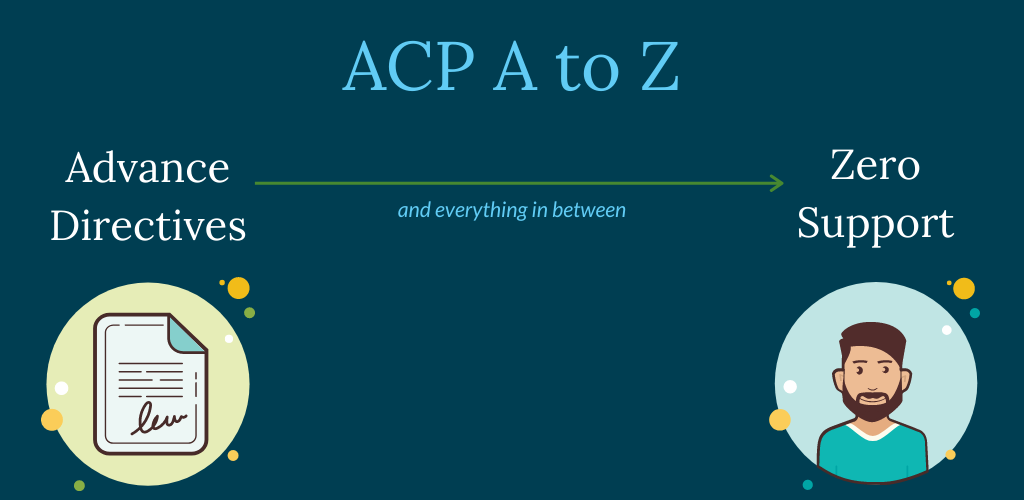for
Individuals
Better Quality of Life
Learn More
Resource

There’s a lot that goes into an Advance Care Plan – we’ve broken down some basic terms, tips, and suggestions from A to Z. This guide is just a start. If you have further questions we encourage you to speak with one of our Advance Care Planning Specialists or your medical provider.
 Advance Directives –
Advance Directives –A written form that lets doctors and loved ones know your preferences for health care. May be confused with Advance Care Planning (preparing for medical decisions you might face in the future).
 Backup –
Backup –Bringing someone with you when you see your doctor, to help you understand and ask the right questions. It doesn’t have to be your Proxy/Medical Power of Attorney (see ‘M’ below). It can be anyone you trust.
 CPR –
CPR –CPR is performed when your heart stops beating. The goal is to restart your heart and normal breathing to prevent death. You may opt out of CPR if you are very ill and don’t expect to get better. Your doctor can issue a ‘DNR’ (Do Not Resuscitate order) if you’re in the hospital. Or an “Out of Hospital” DNR for other times. See ‘E’ and ‘O’ below for more details.
 Dialysis –
Dialysis –Dialysis cleans the blood when the kidneys are too damaged to filter waste & excess fluids. There are different methods of dialysis; some treatments can be done at home.
 EMT –
EMT –Medics do everything to save your life unless a medical order tells them not to. If you are seriously ill you can talk with your doctor about your options for medical orders. Medics are trained to look for medical orders on the refrigerator. It’s recommended that you also carry your orders with you in case you have an emergency while out of the house. See ‘O’ below for more details.
 Feeding Tubes –
Feeding Tubes –They give nutrition and fluids when you cannot eat or drink. “NG” tubes are thin tubes that run into the nose and down to the stomach. They are a short-term solution. When a feeding tube is needed long-term, doctors place a “PEG” tube surgically into the stomach.
 Goals of Care –
Goals of Care –Goals can range & change from Full Treatment to Comfort Care with Selective Measures in between. People may want all possible measures to save their life (“Full Treatment”). People may opt out of life saving treatments and focus on comfort (“Comfort Care”), through services such as Hospice. (See ‘H’ below). Or people may balance living longer with quality of life (“Selective Measures”).
 Hospice –
Hospice –Focuses on comfort at the end of life. An option if you are very sick and there are no curative treatments. Hospice can be offered in home or in a facility. It offers a range of services for the patient and loved ones.
 Intubation –
Intubation –A tube is placed down the throat to help you breathe. This is a short-term solution. When help is needed long-term, doctors place a tube surgically through the neck (a “tracheostomy”).
 Jot Down Questions –
Jot Down Questions –Keep a list of questions between doctor appointments. It can save you time and help you remember what you want to ask. It helps ensure your needs are met by your medical team.
 Keep it Accessible –
Keep it Accessible –Keep your Advance Directive where it’s easy to find in a crisis. (Don’t lock it away in a safe deposit box.) Keep medical orders on the refrigerator.
 Life saving Treatments –
Life saving Treatments –CPR, Intubation, and Ventilation can keep people alive in a crisis. If you do not want all life saving treatments, your doctor must issue medical orders so your wishes are honored.
 Medical Power of Attorney –
Medical Power of Attorney –Also known as a Healthcare Proxy. This is the person you choose to speak for you in a medical crisis. Make sure you share your wishes and documentation with this person. You may also opt to have a backup proxy. See our post on picking a proxy for more detail on how to make this choice.
 New Options –
New Options –Having new treatment options is a great reminder to review your Advance Care Plan and update your Advance Directives. Other good times might be: a change in your condition or diagnosis; if you need to change your proxy; or if there’s a change in what quality of life means to you.
 Orders –
Orders –Medical Orders tell doctors and medics to limit life saving treatments. Examples: CPR (Cardiopulmonary Resuscitation), DNR (Do Not Resuscitate), DNI (Do Not Intubate), DNH (Do Not Hospitalize). Medical Orders must be signed by a doctor. Your doctor may combine these orders in a POLST (portable medical orders). Copies should be carried with you and kept on the refrigerator.
 Palliative Care –
Palliative Care –A team of medical specialists who aim to improve your quality of life. They relieve symptoms of serious illness and side effect of treatment. See our post on debunking myths of palliative care for a deeper look at this type of service.
 Quality vs Quantity –
Quality vs Quantity –Balancing how long you live with the quality of the life you have. What does “quality of life” mean to you? How much treatment do you want? What kind, and for how long? The more specific you are, the easier it will be for your Medical Power of Attorney to make the right decisions for you. This might sound like, ‘I’m ok with a feeding tube, but only for ___ amount of time, if or my chances of full recovery are___.’
 Right Place and Time –
Right Place and Time –When would be the best time for you and your loved ones to talk about your wishes? It might be a quiet moment when you can be alone, a big family gathering, or on the phone. It doesn’t have to be the definitive conversation. Just open the door to discussing what matters most to you.
 Specialist –
Specialist –Our Advance Care Planning Specialists can help you clarify goals, make your wishes known, and take important steps to finalize your plan. Reach out to see if our services are covered by your health plan.
 Talking With Others –
Talking With Others –Sharing your wishes helps doctors provide the treatments you want. It helps your loved ones to support you and can give them peace of mind.
 Update –
Update –Review your Advance Directive and Orders from time to time. Make sure your treatment choices and Proxy still make sense for you now. Ensure that previous copies are destroyed and that your doctor and proxy have copies of your new documents.
 Ventilation –
Ventilation –A ventilator is a machine that helps you breathe when you cannot breathe on your own. It pumps air into your lungs through a tube. If you do not want this you can speak with your doctor about a DNI (Do Not Intubate) Order.
 What Matters Most? –
What Matters Most? –Medical choices are personal. Your care should reflect what is most important to you—your values and goals. Be sure to share what matters most with your Medical Power of Attorney/Proxy and doctor so they understand your wishes.
 Xerox copies –
Xerox copies –Make sure anyone involved in your care and decisions has a copy of your Advance Directives and Orders.
 Your Voice –
Your Voice –Your voice is the most important aspect of your advance care plan. Make sure it’s heard and understood.
 Zero Support –
Zero Support –If you’re navigating your care alone you can still make your wishes known. Document your preferences and share them with your medical team. They may even be able to help link you to supports available to you.